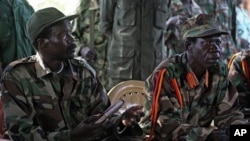Victims of the rebel Lord's Resistance Army in Uganda have had mixed reactions to plans by the International Criminal Court (ICC) to launch proceedings in absentia against the group's fugitive leader, Joseph Kony.
While some say the action against the leader of the bloody two-decade conflict in northern Uganda would be welcomed, others say it's pointless without Kony being brought to justice.
Kony is the International Criminal Court’s longest standing suspect at large. In 1987, he launched his rebellion against the ascent to power of President Yoweri Museveni.
After investigations into the Lord’s Resistance Army rebellion opened in 2004, the ICC issued an arrest warrant against Kony in 2005.
Kony is wanted on 33 counts of war crimes and crimes against humanity. The allegations against him include murder, cruel treatment, enslavement, rape, and attacks against the civilian population.
Despite efforts by different nations, including the United States, to capture him, however, the rebel leader remains elusive.
Last Thursday, Karim Khan, the prosecutor at the International Criminal Court, announced he had applied to launch hearings against Kony in the rebel leader’s absence.
Khan said the move will intensify efforts to find Kony. He noted that it will represent a meaningful milestone for victims who have waited patiently for justice for almost two decades.
Retired Bishop Nelson Onono Onweng spoke with VOA about a May 19, 2004, raid in Lukodi village, which was then a camp for internally displaced people in the Gulu district of northern Uganda. Onweng lived in the camp and was a religious leader there.
Onweng said that on that fateful day, LRA rebels, led by Dominic Ongwen, raided the village, leaving more than 60 people dead. Seventeen of the dead were close relatives of the bishop. Ongwen is serving a 25-year prison sentence.
The bishop said that as a victim, he and others will have confidence in the court if it can deliver justice, even in Kony's absence.
“If they keep waiting until Kony is captured and taken to court, those witnesses may all be dead, and evidence may get lost,” he said. “So, if they could do, because it has taken too long.”
ICC prosecutor Khan argued that if the charges are confirmed in Kony’s absence, a future trial following his arrest could move more quickly and effectively.
Beatrice Akello, a legislator from northern Uganda, said the move is not helpful if Kony is not heard.
“Who will be defending him [Joseph Kony]?” she asked. “After passing the judgment, how will they execute it? I don’t want this thing of dilly dallying. If people want to help us, let them come out and help us. But they should not pretend to be helping us when they are not.”
The Ugandan government has failed multiple times to capture Kony. Henry Oryem Okello, Uganda’s state minister for foreign affairs, said the latest move will place Kony under pressure.
“This will be a Kony out there in the bush who’s now found guilty as opposed to a Kony who is out in the bush there, who’s not subjected to a judgment of guilty on crimes [against] of humanity,” he said.
The LRA was responsible for the abduction of upwards of 60,000 people, including 20,000 children, many of whom were recruited as soldiers. The LRA also displaced close to 1.5 million people and killed an estimated 100,000 others.
Kony’s deadly operations were based in northern Uganda, the Central African Republic, South Sudan and the Democratic Republic of Congo.




